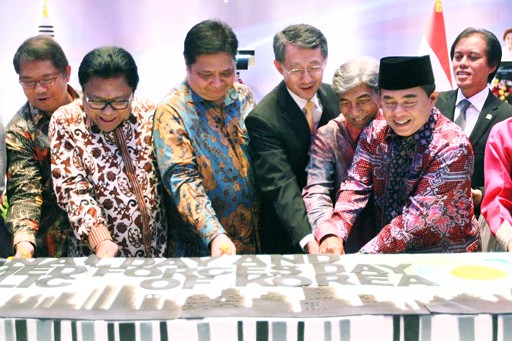Popular Reads
Top Results
Can't find what you're looking for?
View all search resultsPopular Reads
Top Results
Can't find what you're looking for?
View all search resultsSouth Korean investors lambast business obstacles in field
Change text size
Gift Premium Articles
to Anyone
 Land of ginseng: Communications and Information Minister Rudiantara (from left to right), deputy of the Regional Representatives Council Oesman Sapta Odang, Industry Minister Airlangga Hartanto, South Korean Ambassador Cho Tai-young, Deputy Foreign Minister AM Fachir and House of Representatives Speaker Ade Komarudin cut a cake to celebrate South Korea’s National Day on Sept. 30 in Central Jakarta. (JP/ Donny Fernando)
Land of ginseng: Communications and Information Minister Rudiantara (from left to right), deputy of the Regional Representatives Council Oesman Sapta Odang, Industry Minister Airlangga Hartanto, South Korean Ambassador Cho Tai-young, Deputy Foreign Minister AM Fachir and House of Representatives Speaker Ade Komarudin cut a cake to celebrate South Korea’s National Day on Sept. 30 in Central Jakarta. (JP/ Donny Fernando)
S
outh Korean investors have begun complaining of irregularities they face in running their operations in Indonesia, amid the government’s efforts to improve the business climate.
Despite applauding Indonesia’s attempts to ease the business atmosphere by issuing economic policy packages, the Korean Chamber of Commerce and Industry in Indonesia’s (Kocham) president Lee Kang Hyun said many obstacles had caused them trouble in the field.
He cited that immigration officials, for example, often carried out extortion and excessive raids against foreigners, including Korean investors, even at midnight.
“We are here to help the Indonesian economy grow, but we feel like we are treated like criminals,” he said at a South Korean investors’ forum held by the Investment Coordinating Board (BKPM).
Lee said there should be a dedicated hotline to report any wrongdoings committed by officials to provide investors with the assurance of convenience. The BKPM previously established a dedicated desk to serve Korean investors.
“If the situation continues, [...] Indonesia’s image might be at stake,” he said.
Kocham immigration and labor committee chairman Kim Min-gyu presented another problem, saying that in order to change the status of a Temporary Stay Permit (KITAS) to a five-year Stay Permit (KITAP), Korean investors needed to pay additional fees to officers at the immigration office, even though they had fulfilled all administrative requirements.
“They will approve our request only after we pay some amount of money. For each individual, the cost to obtain recommendation is up to Rp 15 million [US$1,149],” she said, adding that if they refused to pay, the applications would not be processed.
The complaints come on the back of the government’s latest efforts to improve the business climate, including by eradicating illegal levies.
President Joko ‘‘Jokowi’’ Widodo said on Oct. 12 that the legal system should be overhauled from top to bottom, adding that immediate and substantial legal reforms were key to improving public services.
A global corruption perception index in 2015 ranked Indonesia in 88th place among the countries surveyed. Denmark, Finland and Sweden were acknowledged as the three least corrupt countries. On the rule of law index, Indonesia ranked 52nd.
The government has issued 13 economic policy packages since September 2015, which includes the acceleration of permit issuance to only three hours. Investors wishing to use the facility are required to invest at least Rp 100 billion or employ 1,000 domestic workers.
Meanwhile, data from the BKPM showed that South Korean investors were the eighth largest in terms of realized investments in the January to September period. Most of the investments, worth $743.81 million, were in manufacturing projects, such as shoes and textile.
Kim Chang-nyun, the Korean Embassy’s ministerial counselor, said the Indonesian government should focus on intensifying partnerships with established investors instead of grabbing new ones.
Hendratmoko, an official at the Immigration Directorate General’s resident permits division, said his office had made regulations easier, including by creating an online application system.
He, however, acknowledged the tight supervision of foreigners.
“Many foreigners come to Indonesia with a visitor’s visa, particularly after the implementation of the free-visa policy. However, they start to conduct other activities, such as working. This is forbidden because they have to earn a permit from the Manpower Ministry,” he said. (fac)









